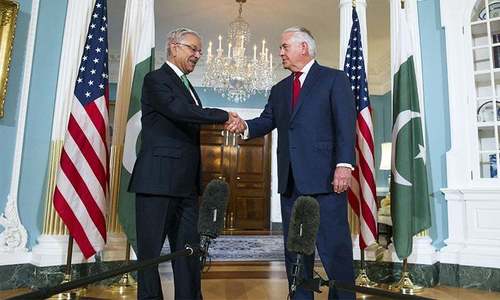WASHINGTON: The United States and Pakistan need to engage in a transaction of interests, instead of each being overly focused on persuading the other that its interests are the ones that need to dominate the conversation, says Laurel Miller, a former US special representative for Afghanistan and Pakistan.
Robin Raphel, a former US assistant secretary of state for South Asia, reminds both that the entire debate about US-Pakistan relations “has gotten far too emotional”.
Zalmay Khalilzad, the former US ambassador to Afghanistan and Iraq, argues that the US needs to counter China’s growing influence with India’s help to prevent Beijing from rebuilding its relationship with Islamabad.
Vikram Singh, the former US deputy assistant secretary of defence, claims that the clash of interests in Afghanistan will also prevent the United States and Pakistan from restoring their alliance.
The four former policymakers gathered at the US Institute of Peace (USIP) this week to review a relationship that is seen in Washington as important and intriguing.
The review precedes US Secretary of State Rex Tillerson’s visit to South Asia later this week that many in Washington believe could have a profound impact on US policies for the region in the near future.
USIP, a Congress-funded federal institution, initiated the dialogue that probed how the new US strategy for South Asia that President Donald Trump announced on Aug 21, was seen in Islamabad and New Delhi.
“Both sides in the relationship are too focused on trying to persuade the other side on the need for the correctness of their point of view,” says Ms Miller.
She believes that the US wants Pakistan to see risks and opportunities in Afghanistan. And the Pakistanis want to persuade the US to recognise the necessity of looking at the problems of the region through a historical and an India-centric lens.
Ms Laurel warns that both arguments — Pakistan’s historical perspective and the US “here and now” approach — would fail to remove the tensions that have strained their relationship. Instead, she urges the US to see not only what are the ways to pressure Pakistan to take its concerns more seriously but also to make it clearer what’s on offer for Pakistan.
“And I don’t mean carrots in the sense of financial assistance. I mean, what the US is prepared to do in terms of its strategy in the region and its vision of the relationship to attract the Pakistanis to something that can be of mutual benefit,” she says.
“And...Pakistanis need to articulate what they are prepared to do and not do. And what’s it that’s on offer from their perspective that could appeal to American interests.”
Ms Raphel notes that the US gets frustrated with the alleged safe havens and Pakistan’s alleged double-game, while Pakistan denies these allegations and reminds the US of all the sacrifices it has made in the past.
This approach “does not really move the whole discussion forward,” she says. “Try to be more dispassionate and rational about this whole issue, it is time to get serious.”
Ms Raphel advises both sides to put on the table some thoughts about the real issues and the first real issue, she believes, what’s the appropriate role of India in Afghanistan?
She points out that the US has exaggerated the Haqqani network’s influence in Afghanistan, as a recent US report traces only 15 per cent terrorist attacks in Afghanistan to this network.
She identifies the lack of governance in Afghanistan as one of the reasons the insurgency in that country still continues.
Ambassador Khalilzad says that the need to counter China’s growing influence is pushing the US towards India. “A stronger India is in our interest and that will have implications for our relationship with Pakistan,” he argues.
Mr Singh says that “the best thing for Pakistan is to have a pliant, friendly Afghanistan where Pakistani influence extends all along the Durand Line and over”.
Published in Dawn, October 23rd, 2017














































